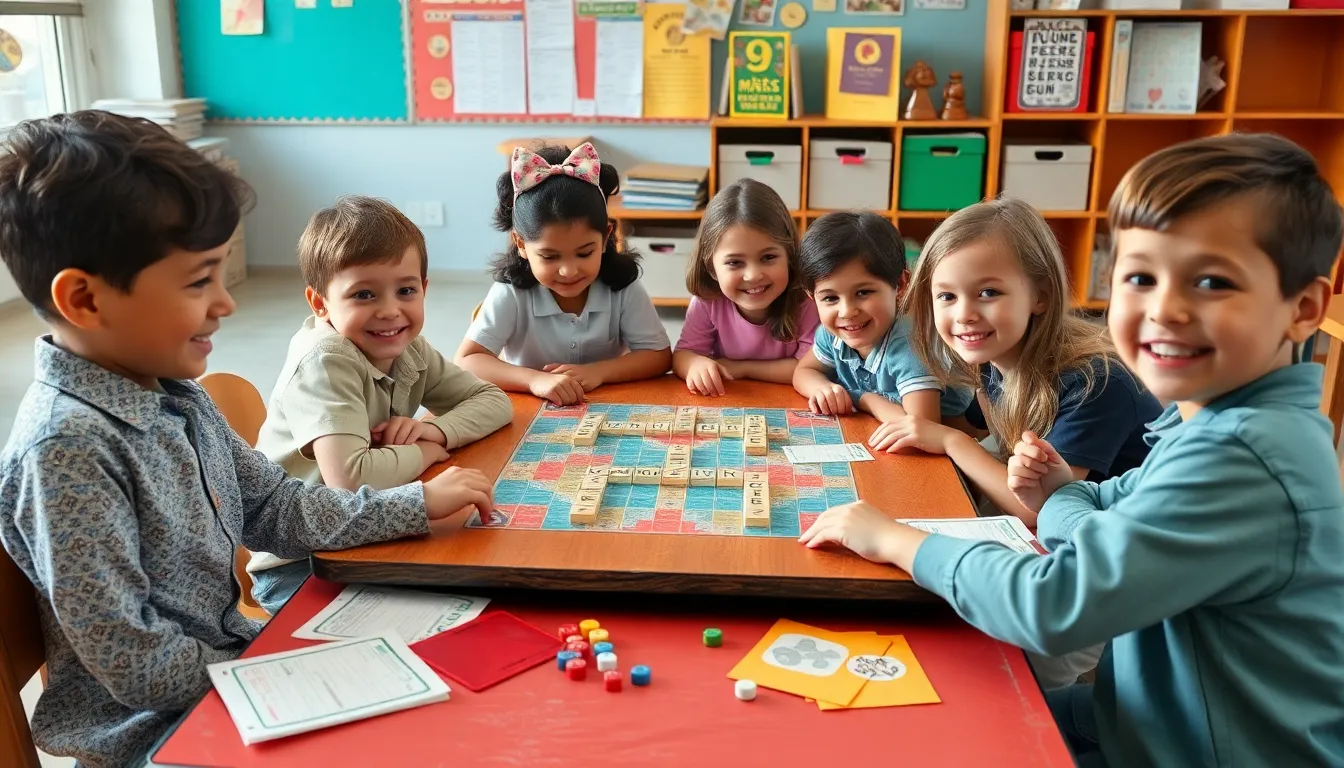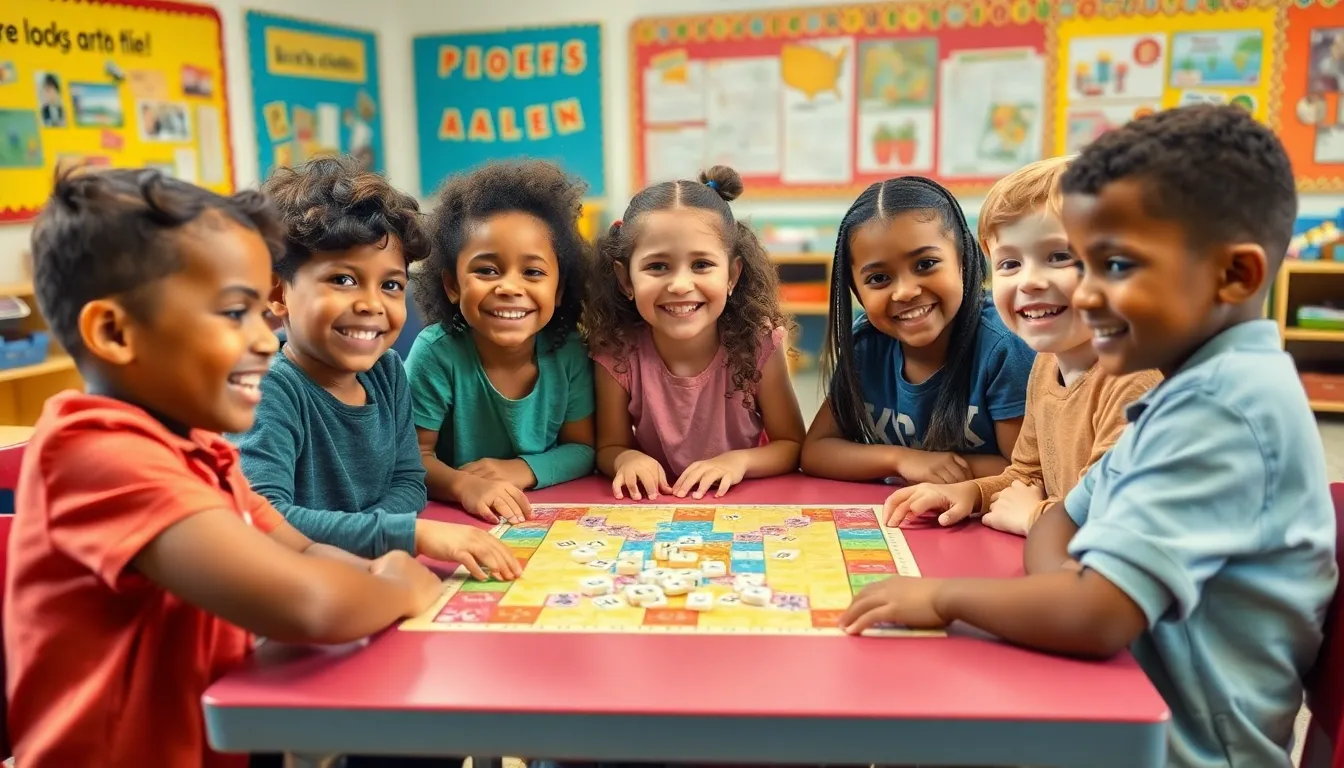Kids and spelling can sometimes feel like oil and water. But what if there was a way to turn those tricky letters into a fun-filled adventure? Enter spelling games! These delightful activities not only make learning enjoyable but also help children master the art of spelling without even realizing they’re studying.
Table of Contents
ToggleBenefits of Spelling Games for Children
Spelling games offer significant advantages for children’s learning. Engaging in these activities stimulates cognitive growth and enhances language abilities.
Cognitive Development
Cognitive development greatly benefits from spelling games. They challenge children’s memory and problem-solving skills through interactive formats. Players often need to recall words and apply them in various contexts, reinforcing mental agility. Engaging with peers in these games fosters social interactions, enhancing communication and teamwork. Research shows that consistent practice in spelling through games leads to improved concentration and focus.
Language Skills Enhancement
Language skills see substantial improvement via spelling games. Children expand their vocabulary as they encounter new words in play scenarios. These games also teach phonics and grammar in an enjoyable way, making learning more effective. By using the words in sentences or phrases, kids gain a practical understanding of language structures. Additionally, spelling games promote reading fluency, allowing children to read more confidently and accurately. As a result, they develop a stronger overall command of the language.
Types of Spelling Games

Spelling games come in various forms, catering to different learning styles. They engage children while enhancing spelling skills through playful interaction.
Traditional Games
Traditional spelling games promote face-to-face interaction. Scrabble allows players to create words on a board, encouraging vocabulary expansion and spelling practice. Word searches challenge kids to find hidden words, honing visual recognition. Bingo combines luck and skill, reinforcing word recall through a fun format. Flashcards offer a straightforward method for memorization, enabling repetitive learning. Each game contributes to improving spelling proficiency in a collaborative environment.
Digital Games
Digital spelling games facilitate interactive learning. Online platforms provide a variety of quizzes that adjust to different skill levels, ensuring appropriate challenges. Mobile apps often feature fun animations that capture children’s attention while teaching spelling rules. Virtual spelling bees create competitive environments, motivating kids to enhance their spelling abilities. Interactive story-building games allow children to construct narratives, integrating spelling practice with creativity. Each digital option reinforces spelling skills with modern, engaging methods.
Choosing the Right Spelling Game
Selecting an appropriate spelling game enhances children’s learning experiences. Consider key factors to ensure maximum engagement and effectiveness.
Age Appropriateness
Age appropriateness significantly influences the game’s impact. Younger children benefit from games with colorful visuals and simple words. Games suitable for them include flashcards and basic word searches. For older kids, challenges like Scrabble and interactive apps provide advanced vocabulary opportunities. Parents and educators should assess the child’s current skill level and interests in choosing games. Selecting the right difficulty level encourages motivation and sustained interest.
Learning Objectives
Learning objectives shape the selection process for spelling games. Determine specific goals, such as improving phonemic awareness or enhancing vocabulary. Games designed to teach phonics enable children to grasp the fundamentals of word formation. Interactive platforms can also focus on grammar and spelling patterns. Emphasizing objectives allows children to track their progress effectively. Games that align with these goals foster a sense of achievement and reinforce learning outcomes.
Popular Spelling Games for Children
Spelling games engage children in enjoyable ways while improving their language skills. Here are two popular options that kids love.
Game 1: Scrabble
Scrabble encourages players to create words using letter tiles on a grid. This game promotes strategic thinking and expands vocabulary. Children learn to recognize letter combinations while aiming for high-scoring words. Play can involve two to four players, making it a social activity. With a standard set, players receive seven tiles at the start. Each turn involves forming new words by adding to existing ones. The scoring system teaches basic math skills alongside spelling. Enhanced concentration and problem-solving skills develop as they navigate the board. Scrabble offers opportunities for older children to challenge themselves with complex words while younger players can focus on simpler terms.
Game 2: Boggle
Boggle presents a different spelling challenge by arranging letters in a 4×4 grid. Players race against a timer, searching for words formed from adjacent letters. This fast-paced format increases excitement and encourages quick thinking. Each player aims to find the most words before time runs out. It accommodates multiple players, fostering friendly competition. Children can discover new vocabulary while developing their spelling abilities. Scoring rewards longer words, making strategic word selection crucial. As kids play, they enhance cognitive skills, such as memory and recognition. Boggle fits various age groups, allowing younger children to enjoy simpler word forms while older kids tackle longer, more complex words.
Spelling games offer a dynamic way for children to enhance their language skills while having fun. By integrating these engaging activities into their learning routines, kids can develop a stronger foundation in spelling and vocabulary. The variety of traditional and digital games available ensures that children of all ages can find something that resonates with their learning style.
Selecting the right game based on age and learning objectives can further enrich the experience. As children play and interact with words, they not only improve their spelling but also boost cognitive abilities and social skills. Embracing spelling games can turn a challenging task into an enjoyable adventure that fosters a lifelong love for language.








